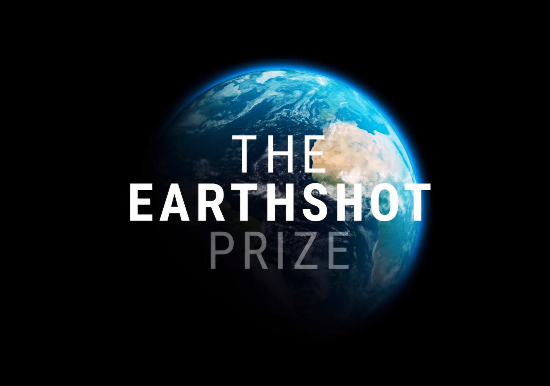The grandson of the United Kingdom’s Queen Elizabeth, Prince William, second in line to the throne, founded the Earthshot Prize recently because he was concerned about global efforts to mitigate global warming. Earthshot addresses five global challenges to address by 2030. Each Earthshot entry has a requirement to achieve within its category of entry a scientifically agreed-to target by 2030. Categories included a focus on the following:
- Protect and restore nature
- Clean our air
- Revive our oceans
- Build a waste-free world
- Fix our climate
The first winners, as well as finalists for each category, were onstage along with Prince William in the first week of the just concluded COP26 conference in Glasgow. The Prince described his Earthshot initiative as a plan “to galvanize and bring together the best minds, the best possible solutions, to determine and address some of the world’s greatest environmental challenges. We have to harness our ingenuity and our ability to invent. The next ten years are a critical decade for change. Time is of the essence, so we believe this ambitious global award is the only way forward.”
I will discuss the results of COP26 in a future posting but the above words seemed to largely be ignored by the gathering of political leaders in Glasgow over these last two weeks. But more on that later.
Let’s look at the winners of the five Earthshot categories.
1. Protect and Restore Nature
Costa Rica, the small Central American nation no bigger than West Virginia, was recognized for its long-serving conservation model involving communities and citizens in protecting the country’s natural terrestrial and marine ecosystems. The initiative, Payment of Environmental Services (PSA), provides income to communities and citizens and goes back to 1997. The first dedicated conservation zones were established in 1963. Today the land-based conservation zones have grown to 10 and the country has reversed the deforestation of the previous century to the point that in 2020, forests covered 52.4% of its entire land-based territory.
The President of the country, Carlos Alvarado, described his reaction when he heard about the award.
“Today the country demonstrates once again to the world that we are pioneers in successfully developing conservation models on land…We will invest these resources in replicating and strengthening these models in marine conservation; We know that we must be diligent and act now to counteract the impacts of climate change, or the effects will be irreversible.”
Alvarado noted that 92% of the country’s territory is marine today with 2.7% of it protected. The money from the award will help initiate an equivalent marine ecosystem conservation model. Protected areas in Costa Rica today have become engines of economic development and a major draw for tourists. The plan now will be to extend the work to the country’s offshore environments. The marine conservation model will evaluate the ocean’s natural resources providing innovative programs in protected areas with payments similar to the land conservation initiative for marine ecosystems.
2. Clean Our Air
An Indian company, Takachar, which describes itself as a social enterprise, was the Earthshot winner in this category. Takachar has developed an inexpensive and portable device to attach to tractors to convert crop residue into sellable bioproducts like fuel and fertilizer. Currently, in India and other countries, much of this biomass is burned in the open each year contributing volatile particulate matter into the air.
Takachar’s technology makes it possible to eliminate more than 95% of smoke emissions from the common practice of burning crop and forest residue in the open. The Earthshot award should help the company to increase production of units of its portable system which uses a novel concept called oxygen-lean torrefaction, a type of pyrolysis that converts waste at relatively low temperatures, (typically between 200 and 320 Celsius) into a dry end product with no smoke emissions.
Takachar’s goal for 2030 is to mitigate up to 700 million tons of carbon dioxide (CO2) emissions annually while increasing income to rural communities by 40% through the creation of a market for torrefaction process end products.
The importance of this technology for India’s future cannot be underestimated just in looking at current events. In the last week, the open burning of biomass from waste and surrounding farmland has led to emergency measures being issued in Delhi and the National Capital Region of the country. Worsening pollution is producing high levels of particulate matter in the air (almost off the measurable scale) and a toxic white foam on the main river that flows through the city. The condition is expected to continue for several more weeks threatening the health of Delhi’s over 30 million inhabitants.
3. Revive Our Oceans
Coral reefs can be found throughout the world largely in shallow waters of our oceans and seas. They are home to almost 25% of the 500,000 marine animal species on the planet. Described as tropical oases, they are the equivalent of land-based tropical rainforests and today, they are in peril all over the world because of ocean acidification and warming. Current predictions indicate up to 90% of coral reefs could be gone by 2050.
To reverse this, Coral Vita, a Freeport, Grand Bahama company, was established to grow coral on land for replanting in degraded ocean reefs. Coral Vita’s methods grow coral as much as 50 times faster than other systems and processes with a single coral farm able to supply enough for a country’s offshore reef systems.
The farms are also proving to be an educational resource within the countries where they are established and an eco-tourism attraction. A single farm has the capacity to grow millions of resilient corals annually. With the money from the Earthshot award, combined with the company’s adopt-a-coral program, it should help to scale its growth enabling the creation of more coral farms in countries where threatened reef systems exist.
4. Build a Waste-Free World
Back in 2015, I wrote the following:
‘We, humans, waste 1.3 billion tons of food every year. The loss amounts to 2 to 3% of global gross domestic product (GDP). It happens on a planet where one in nine of us is malnourished. And it contributes 3.3 billion tons of greenhouse gases (GHGs) to the atmosphere every year. That makes food waste the third largest emitter of GHGs after China and the United States.”
That’s what makes the program established by the city of Milan, Italy, an important first step in ending this human practice. Back in 2019, to address the problem of fresh food being thrown into landfills, Milan launched a food-waste recovery program aimed at halving the amount of discarded fresh food in the city by 2030.
It was the first program of its kind in the world and has become core to the city’s waste management program involving public companies, major retailers, supermarkets, restaurants, universities and private businesses.
The city currently operates three food-waste hubs responsible for collecting and redistributing fresh food. The current capacity for each hub is 130 tons per year or the equivalent of collecting and delivering 260,000 meals to those in the city in need. The Earthshot award should help Milan as it plans to open two additional waste-food hubs in the near future.









